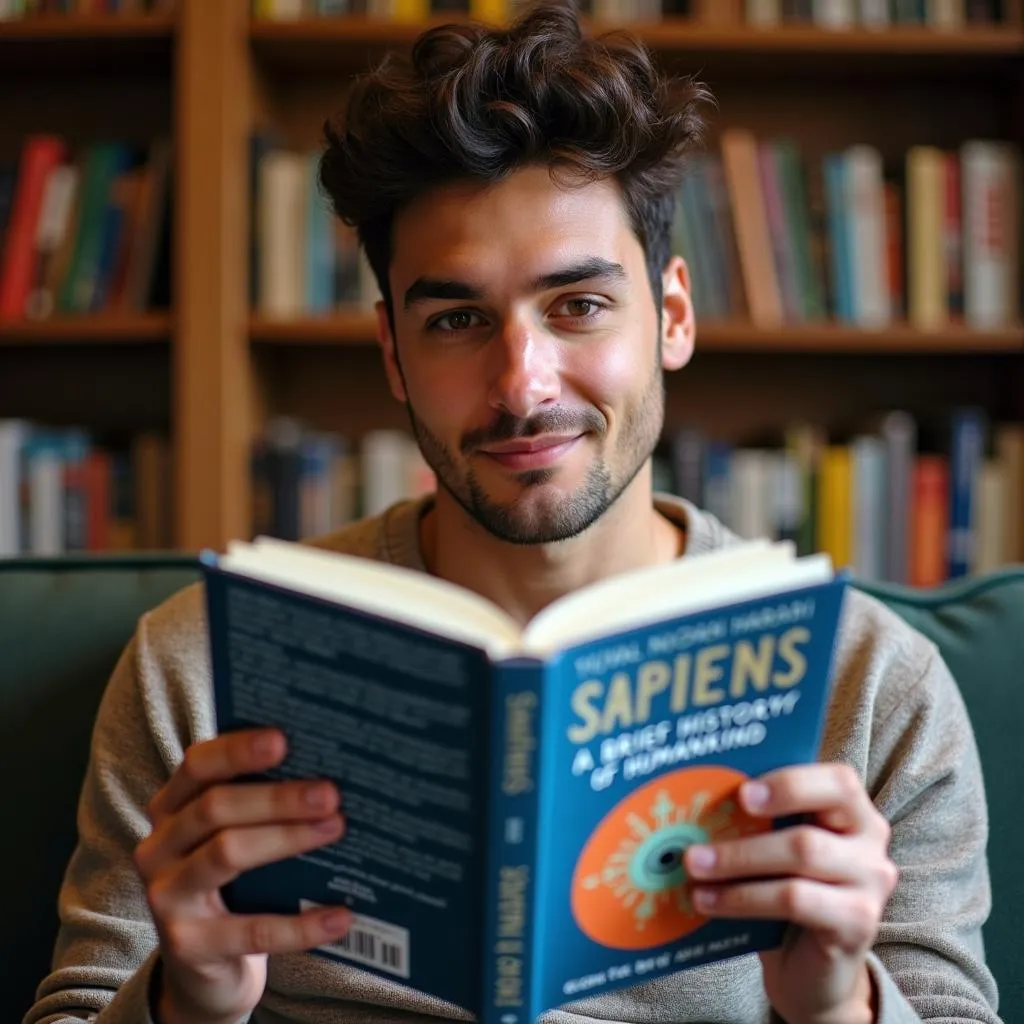The IELTS Speaking test often includes questions about books and reading habits, making it essential for test-takers to be prepared to discuss this topic fluently. One common question that frequently appears is “describe a book you read that you would recommend to others.” This article will provide you with valuable insights and strategies to excel in answering this question and similar ones in your IELTS Speaking exam.
Nội dung bài viết
Part 1: Introduction and Interview
In the first part of the IELTS Speaking test, you may encounter questions related to books and reading. Here are some common questions examiners often ask:
- Do you enjoy reading books?
- What type of books do you usually read?
- How often do you read books?
- Do you prefer physical books or e-books?
Let’s look at a sample answer for the question “Do you enjoy reading books?”:
Sample Answer (Band 8-9):
“Absolutely! I’m an avid reader and find immense pleasure in delving into various genres. Reading not only broadens my horizons but also allows me to escape into different worlds and perspectives. I particularly enjoy how books stimulate my imagination and provide food for thought long after I’ve finished reading them.”
Describe a time when you tried to learn something on your own can be another interesting topic to explore in your IELTS Speaking preparation, as it relates to personal growth and learning experiences.
Part 2: Long Turn (Cue Card)
In this section, you’ll be given a cue card with a topic to speak about for 1-2 minutes. Here’s a sample cue card related to our main topic:
Describe a book you read that you would recommend to others
You should say:
- What the book is about
- When you read it
- Why you would recommend it to others
- And explain how it impacted you
Sample Answer (Band 8-9):
“I’d like to talk about a thought-provoking book I recently read called ‘Sapiens: A Brief History of Humankind‘ by Yuval Noah Harari. This captivating work delves into the history of our species, from the Stone Age to the present day, offering a fresh perspective on how we’ve evolved and shaped our world.
I read this book about six months ago, and I was immediately engrossed by its compelling narrative and insightful analysis. What I found particularly fascinating was how Harari weaves together various disciplines such as biology, anthropology, and economics to paint a comprehensive picture of human history.
I would wholeheartedly recommend this book to others because it challenges conventional thinking and encourages readers to question long-held beliefs about our society and culture. It’s not just a history book; it’s a thought experiment that prompts us to reconsider our place in the world and our impact on it.
The book has profoundly impacted my understanding of human progress and the complex interplay between our biology and culture. It has sparked numerous discussions with friends and family, broadening our perspectives on topics ranging from agriculture to artificial intelligence. Moreover, it has inspired me to delve deeper into other areas of human history and anthropology, igniting a passion for lifelong learning.
In essence, ‘Sapiens‘ is more than just a book; it’s a mind-expanding journey that I believe everyone should experience. Its ability to provoke thought and stimulate intellectual curiosity makes it a truly remarkable read that I’m always eager to discuss and share with others.”
 IELTS Speaking: Describing a recommended book
IELTS Speaking: Describing a recommended book
Follow-up questions:
- How has this book changed your perspective on human history?
- Would you recommend this book to people of all ages? Why or why not?
Sample Answers (Band 8-9):
-
“This book has revolutionized my understanding of human history by presenting it as a series of revolutions – cognitive, agricultural, and scientific. It’s made me realize the interconnectedness of historical events and how they’ve shaped our present. Moreover, it’s challenged my assumptions about progress, making me question whether all changes in history have been beneficial for our species and the planet.”
-
“While I believe the book has universal appeal, I would primarily recommend it to young adults and older readers. The concepts discussed are quite complex and require a certain level of maturity to fully grasp. That said, I think it could be an excellent resource for stimulating critical thinking in advanced high school students. Ultimately, it’s ideal for anyone who’s curious about the big questions of human existence and is ready to have their worldview challenged.”
Part 3: Two-way Discussion
In this part, the examiner will ask you more abstract questions related to the topic. Here are some possible questions and sample answers:
Q: How do you think reading habits have changed in the digital age?
Sample Answer (Band 8-9):
“The digital age has undoubtedly transformed reading habits in numerous ways. On one hand, e-books and online articles have made content more accessible and convenient, allowing people to carry entire libraries on their devices. This has led to an increase in casual reading, particularly of short-form content.
However, this convenience has also resulted in shorter attention spans and a tendency to skim rather than deep read. Many people now prefer bite-sized information, which can be detrimental to comprehension and critical thinking skills.
On a positive note, the internet has democratized publishing, giving voice to diverse authors and niche topics that might not have found a platform in traditional publishing. This has broadened the range of perspectives available to readers.
Social media and online book communities have also changed how we discover and discuss books, creating virtual book clubs and fostering a more interactive reading experience.
Overall, while the digital age has brought both challenges and opportunities to reading habits, I believe the key is to strike a balance between digital and traditional reading, harnessing the benefits of technology while preserving the immersive experience of reading a physical book.”
Describe a store where you often shop could be an interesting tangent to explore, as many bookstores now offer both physical and digital reading options, reflecting the changing landscape of reading habits.
Q: Do you think schools should focus more on encouraging students to read for pleasure?
Sample Answer (Band 8-9):
“Absolutely, I believe schools should place a greater emphasis on encouraging students to read for pleasure. Reading for enjoyment cultivates a lifelong love of learning and offers numerous benefits that extend far beyond academic achievement.
Firstly, reading for pleasure enhances vocabulary and language skills in a natural, contextualized manner. It exposes students to diverse writing styles and complex sentence structures, which can improve their own writing and communication abilities.
Moreover, pleasure reading fosters empathy and emotional intelligence by allowing students to experience different perspectives and cultures through literature. This is crucial in developing well-rounded individuals capable of understanding and navigating our increasingly complex world.
Reading for enjoyment also promotes critical thinking and imagination. When students engage with texts they find interesting, they’re more likely to analyze, question, and creatively interact with the content.
However, the challenge lies in implementation. Schools need to strike a balance between prescribed reading for curriculum purposes and allowing students the freedom to choose books that interest them. This could involve dedicating time for free reading, creating cozy reading spaces in schools, and organizing book clubs or reading challenges.
By fostering a culture of reading for pleasure, schools can help students develop not just academic skills, but also lifelong learning habits and a broader worldview. This approach could potentially transform education from a purely academic exercise to a more holistic development of students’ minds and personalities.”
 Students enjoying reading in a school library
Students enjoying reading in a school library
Key Vocabulary and Phrases for High Scores
To achieve a high score in your IELTS Speaking test when discussing books and reading, consider using these advanced vocabulary items and phrases:
-
Engrossing /ɪnˈɡrəʊsɪŋ/ (adj): Very interesting and holding one’s complete attention.
Example: “The novel was so engrossing that I couldn’t put it down.” -
Thought-provoking /ˈθɔːt prəˌvəʊkɪŋ/ (adj): Stimulating careful consideration or attention.
Example: “The author’s thought-provoking ideas challenged my preconceptions.” -
Page-turner /ˈpeɪdʒ ˌtɜːnə(r)/ (n): A very exciting or interesting book.
Example: “This thriller is a real page-turner; I stayed up all night to finish it.” -
Delve into /delv ˈɪntə/ (phrasal verb): To examine or investigate something thoroughly.
Example: “The biography delves into the artist’s personal life and creative process.” -
Broaden one’s horizons /ˈbrɔːdn wʌnz həˈraɪznz/ (idiom): To expand one’s range of interests, experiences, and knowledge.
Example: “Reading diverse genres helps to broaden one’s horizons and gain new perspectives.”
Describe a time when you attended a traditional ceremony can be an excellent opportunity to showcase your vocabulary skills in a different context, demonstrating your ability to discuss various topics fluently.
Examiner’s Advice
To excel in the IELTS Speaking test when discussing books and reading:
- Prepare a range of book-related vocabulary and practice using it naturally in sentences.
- Read widely across different genres to be able to discuss various types of books confidently.
- Practice summarizing book plots and themes concisely yet engagingly.
- Develop personal opinions about books and be ready to explain your preferences.
- Connect books to broader themes like culture, society, or personal growth to demonstrate critical thinking.
- Use specific examples from books you’ve read to illustrate your points.
- Practice speaking about books with friends or a language exchange partner to improve fluency.
Remember, the key to success in the IELTS Speaking test is not just about what you say, but how you say it. Aim for fluency, coherence, and a natural conversational style while showcasing your vocabulary and grammar skills.
Describe a foreign food you tried for the first time is another interesting topic that can help you practice descriptive language and personal experiences, which are valuable skills for the IELTS Speaking test.
By following these strategies and continuously practicing, you’ll be well-prepared to discuss books and reading in your IELTS Speaking test, potentially boosting your score and confidence.


